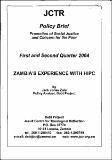Zambia’s Experience With HIPC
Abstract
The HIPC Initiative was first launched in 1996 by the International Monetary Fund (IMF) and the World Bank, with the aim of ensuring that no poor country faces a debt burden it cannot manage. The Initiative entails coordinated action by the international financial community, including multilateral organisations, (e.g., IMF and World Bank) and governments, to reduce to sustainable levels the external debt burdens of the most heavily indebted poor countries. Following a comprehensive review of HIPC I in September 1999, a number of modifications were approved. HIPC II was designed to provide faster, deeper and broader debt
relief and to strengthen the links among debt relief, poverty reduction and social policies.Zambia accessed the Initiative in 2000,
reaching the so-called "decision point.” This occurred after a three-year track record of macro and structural reforms and sound policies as spelt out by the IMF and the World Bank. The process entailed the preparation of the Poverty Reduction Strategy Paper (PRSP), which was to act as a blueprint for national planning and development. Zambia was expected to reach the “completion point” by December 2003. For reasons to be noted later this was not the case. Therefore we are currently on a quest to reach that point by December 2004.
Description
The Debt Project of the Jesuit Centre for Theological Reflection (JCTR) has closely followed this topic of HIPC, providing analysis and education for the advocacy efforts of our Jubilee-Zambia campaign. This current Policy Brief presents background information on HIPC, examines its strengths and weaknesses for Zambia, explains the “completion point" problems, and offers clear
recommendations from Jubilee-Zambia for the way forward.
